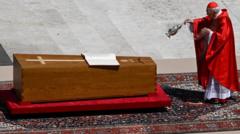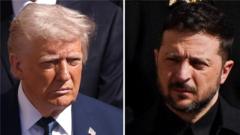In light of Pope Francis's recent passing, discussions about his potential canonization have gained momentum. Historically, achieving sainthood has been reserved for those exhibiting extraordinary virtues and holiness. While two of the five popes preceding Francis have been canonized, the journey toward this esteemed title has evolved, reflecting a more stringent evaluation process by the Catholic Church.
Pope Francis: An Analysis of Potential Canonization and His Papal Legacy

Pope Francis: An Analysis of Potential Canonization and His Papal Legacy
The journey of canonization for Pope Francis raises questions about the evolving process in the Catholic Church.
Since St. Peter's time, who was the first pope, the early canonization practices saw a majority of popes recognized as saints shortly after their deaths. In fact, 48 out of the first 50 popes received this accolade. Fast forward to today, only a fraction—80 of the 266 popes over nearly two millennia—has been canonized, with the current canonization path involving meticulous scrutiny by the Dicastery for the Causes of Saints.
This investigation into a pope's character includes their writings, devotion to God, and overall piety, with those deemed fit being declared "venerable." Subsequently, candidates require validation of two miracles attributed to their intercession for beatification and canonization. The pope holds the authority to grant sainthood, thus placing significant weight on individual pontiff decisions.
Pope Francis presided over the canonizations of his predecessors John XXIII and John Paul II during a momentous ceremony in 2014. Previous to this, ritualistic delays characterized the canonization process, with an average span of 262 years from death to recognition between 1588-1978. Recent papacies, however, have expedited this timeframe; the waiting period for starting the sainthood inquiry now stands at five years, a timeline which was notably waived in John Paul II’s case soon after his death, prompting concern about the potential hastiness of the ongoing canonization deliberations in the church.
As investigations into the legacies of recent popes intensify, critics of John Paul II questioned whether his swift canonization, particularly after allegations concerning his handling of clerical sexual abuse cases, was justified. The trajectory of Pope Francis's legacy may also be under similar scrutiny as the church navigates modern moral and ethical dilemmas in the post-2020 landscape.
Ultimately, Pope Francis's pathway to potential sainthood will hinge not only on his actions during his papacy but also on the broader historical context of canonization practices which have evolved significantly – highlighting the intersection of faith, morality, and ecclesiastical accountability in the contemporary church.
This investigation into a pope's character includes their writings, devotion to God, and overall piety, with those deemed fit being declared "venerable." Subsequently, candidates require validation of two miracles attributed to their intercession for beatification and canonization. The pope holds the authority to grant sainthood, thus placing significant weight on individual pontiff decisions.
Pope Francis presided over the canonizations of his predecessors John XXIII and John Paul II during a momentous ceremony in 2014. Previous to this, ritualistic delays characterized the canonization process, with an average span of 262 years from death to recognition between 1588-1978. Recent papacies, however, have expedited this timeframe; the waiting period for starting the sainthood inquiry now stands at five years, a timeline which was notably waived in John Paul II’s case soon after his death, prompting concern about the potential hastiness of the ongoing canonization deliberations in the church.
As investigations into the legacies of recent popes intensify, critics of John Paul II questioned whether his swift canonization, particularly after allegations concerning his handling of clerical sexual abuse cases, was justified. The trajectory of Pope Francis's legacy may also be under similar scrutiny as the church navigates modern moral and ethical dilemmas in the post-2020 landscape.
Ultimately, Pope Francis's pathway to potential sainthood will hinge not only on his actions during his papacy but also on the broader historical context of canonization practices which have evolved significantly – highlighting the intersection of faith, morality, and ecclesiastical accountability in the contemporary church.






















